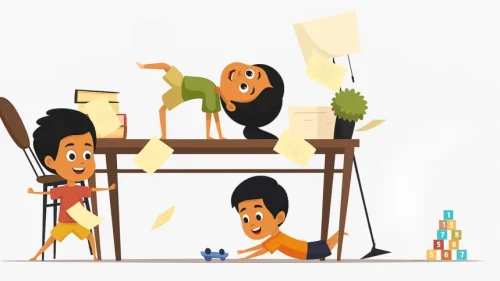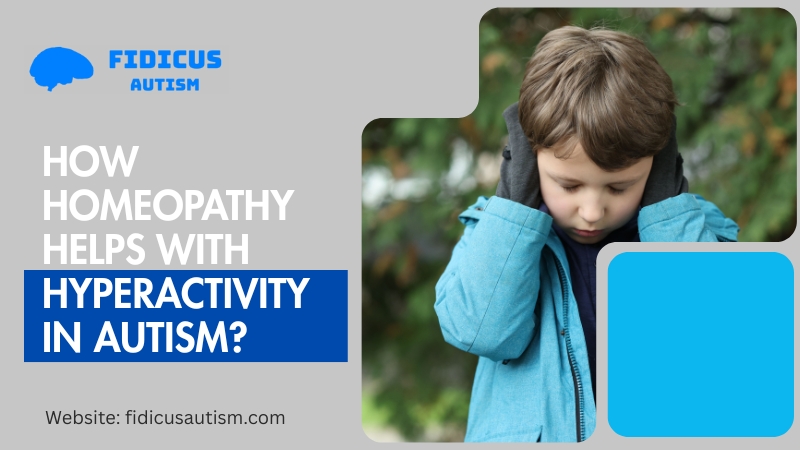Hyperactivity in autism is also one of the most frequent issues raised by parents because it influences a child’s capacity to focus, learn, and communicate easily with people. Children then become fidgety, impulsive, or always restless, which creates inconvenience in daily situations. A lot of parents seek effective and safe means on how they can minimize hyperactivity in autism without relying only on potent drugs. This is where homeopathy comes into play.
Homeopathy works by treating the child as a complete individual, addressing not only surface-level hyperactive traits but also emotional and physical root causes of hyperactivity, and thus proving to be a very effective method for curing Behavioural Disorders in Children It offers mild, natural remedies that soothe over-stimulation, sharpen concentration, and restore equilibrium to the child’s system. Under the proper guidance, parents can learn to manage a hyperactive child safely and holistically, making life easier to manage on a daily basis while facilitating long-term growth.
What is Hyperactivity?
Hyperactivity is a condition of perpetual restlessness, impulsive behaviors, and inability to remain focused. Hyperactive children can be unable to remain seated, often interrupt, or behave without thinking. Some degree of energy is typical in developing children, but persistent inactivity that interferes with daily functioning indicates a problem.
Hyperactivity in children with autism is accompanied by other problems such as sensory overload, rigid routines, and communication difficulties. This makes hyperactivity in autism exceptionally difficult in comparison with normal childhood hyperactivity.

How is Hyperactivity Different from ADHD?
Some children may have both autism and ADHD, but treatment must be personalised. This distinction is vital for parents exploring how to control hyperactive child behaviour effectively. Parents sometimes misinterpret hyperactivity associated with autism with Attention Deficit Hyperactivity Disorder (ADHD). Both have similarities, but differ based on origin and treatment needs:
- With Autism: Hyperactivity typically emerges from sensory overload, anxiety, or being unable to express needs. An example of a child who is overstimulated might jump, flap hands, or pace.
- With ADHD: Hyperactivity comes from challenges related to impulse control and attention regulation, not sensory issues.
A child may have the diagnosis of autism as well as ADHD; however, treatment must be individualized. These differences are important for every parent that is trying to figure out how to manage their child’s hyperactive behaviour.
Signs of a Hyperactive Child
Recognising hyperactivity early can help parents access timely intervention, thereby avoiding bigger issues later. Every child gets bursts of energy from time to time, but if a pattern of overactivity is recurrent and impacts day-to-day life, it may indicate an underlying issue. Some common behaviours might include:
- Constantly moving (running, climbing, or jumping) even when it is inappropriate to do so.
- Very rarely able to remain in a seated position, during meals or classrooms or activities.
- Blurting out answers or interrupting conversations or discussions frequently.
- Impulsivity (acting without thinking of consequences).
- Inability to maintain focus on schoolwork or other specific tasks.
- Overly talkative or noisy play.
- Sleep issues, which leads to more restlessness.
If many of these behaviours are occurring consistently, it is worth considering top to bottom methods with homeopathy, or more structured parenting.

Why Managing Hyperactivity Matters in Autism?
Hyperactivity means more than “too much energy.” When ignored, it detracts from a child’s development, learning, and social skills. Hyperactivity poses a challenge in children on the autism spectrum. Here are some areas of concern:
Learning challenges: A child who gets up from their seat or cannot focus misses out on learning and completing homework. Over time, these children fall behind academically, and eventually begin to lose their confidence in learning.
Social skills: Impulsive behaviours like interrupting during conversations or acting aggressively can decrease a child’s ability to develop lasting friendships. These behaviours can also increase isolation, low self-esteem, and frustration in the child.
Parents stress: Parents may be overwhelmed by a child who is constantly restless at home. Coping with tantrums, sleepless nights, or unsafe behaviours can take an emotional toll, and in some cases, burnout.

How Homeopathy Helps with Hyperactivity in Autism?
Homeopathy aims to treat the whole child, not just suppress symptoms. Homeopathy examines behavior, emotions, physical health, and environmental triggers to create an individualized treatment plan. Because hyperactivity often has multiple causes, this holistic treatment approach is particularly appropriate for children on the autism spectrum. Here are the usual steps involved in the process:
Step 1 – Holistic Assessment
The initial consultation is often the most significant. A homeopath takes a great deal of time to appreciate the child’s complete picture, including:
- Behavioral patterns – restlessness, repetitive movements, impulsivity, attention span, and impact on school or home environments.
- Triggers – noise, bright lights, crowds, transitions from activity to activity, and emotional stressors.
- Physical health – sleep quality, appetite, digestion, bowel habits, and general vitality.
- Emotional tendencies – anger, fear, excitement, anxiety, and/or sensitivity to criticism.
In gathering these pieces of information the homeopath is able to identify the underlying sources of hyperactivity associated with autism, rather than merely the outward facing restlessness.
Step 2 — Remedy Selection
Homeopathic remedies are extremely individualized. The purpose is to choose a remedy that resonates with the child pattern of being — the unique collection of body, mind, and emotional characteristics. Common remedies to consider includes:
- Tarentula Hispanica – For niggling restlessness, constantly in motion, and kids who can’t stay still.
- Cina – Suggested when there is predominantly irritability, aggression, and fidgeting behaviours, often in kids who are grinding their teeth or who do not want to be touched.
- Tuberculinum – For destructive impulses, mood fluctuations, and tons of energy with little tolerance for limitations.
- Hyoscyamus – Indicated for attention-seeking behaviours, jealousy, random outbursts, and difficulty controlling impulsive behaviour.
This is simply an example. A homeopathic physician will prescribe a remedy after a thorough assessment — it is not to be self-prescribed.
Step 3 — Gentle Action, No Side Effects
Homeopathy, unlike traditional medications, which might calm a child momentarily through sedation, works by reassuringly stimulating the body’s inherent ability to heal itself. Over time, it will:
- Decrease impulsivity and restlessness.
- Increase attention and focus.
- Support emotional equilibrium.
- Aid sleep and digestion, which often aggravate inattention and hyperactivity.
Parents appreciate that homeopathic remedies are safe, non-addictive, and do not create long-term side effects making them appropriate for children.
Step 4 — Ongoing Monitoring and Adjustment
Homeopathy is a process instead of a quick fix. Therefore, progress is monitored during follow-up consultations where the homeopath will possibly change remedies, or potencies, due to changes made. Parents are usually asked to:
- Keep a behaviour journal to note changes or any difficulties.
- Record any changes in sleep, appetite, alertness, and play/social engagement.
- Provide frequent updates to ensure the remedy plan is in sync with the child’s changing needs.
This custom and accommodating approach allows for treatment to unfold and progress with the child, rather than stay stagnant and symptom focused.

Daily Strategies to Control Hyperactive Behaviour
Homeopathy is most successful when integrated into stable day-to-day routines and parenting techniques. Parents can attempt to:
- Establish routine: Predictable routines give the children a sense of safety.
- Introduce movement breaks: Short bursts of physical activity help children work off excess energy in a meaningful way.
- Speak in calm tones: Speak simply and use short, easy to follow instructions to avoid overwhelming children.
- Promote positive reinforcement: Praise children for calm behaviour to help motivate them.
- Undermine screen time: Exchange over stimulating devices for calming activities.
- Sleep hygiene: Pick a bedtime, reduce noise, and introduce relaxation before bed.
These are effective methods for parents who are unsure about how to control hyperactive children on a daily basis.
Lifestyle and Environmental Support
Minor changes in your home can have a significant change:
- Diet: Stay away from processed foods, artificial additives, and sugar. Eat foods high in magnesium (such as nuts and grains), fruits, and protein.
- Sleep: Rest helps restore emotional balance / normalcy and control hyperactivity.
- Sensory environment: Reduce noise, bright lights, and crowded spaces. Offer calming alternatives (such as a weighted blanket, or sensory toys).
These changes can profoundly increase quality of life when integrated with homeopathy.
When to Seek Professional Help?
Although homeopathy is gentle and safe, immediate professional support is needed if:
- The child has intrusive self-harm, aggression, and impossible thoughts of harm.
- There are sudden and serious changes in behavior.
- Safety becomes a risk due to impulsive behavior.
Using a team approach – homeopaths, therapists, and educators ensures the child receives complete care.
FAQs on Hyperactivity and Homeopathy
Q1. Can homeopathy cure hyperactivity in autism completely?
Homeopathy does not claim to “cure” autism, but it can significantly reduce hyperactivity, improve attention, and support emotional balance.
Q2. How long does treatment take?
Some children respond within weeks, while others may take months. Progress depends on the severity of hyperactivity and overall health.
Q3. Is homeopathy safe for children?
Yes, homeopathic remedies are safe, natural, and free from harmful side effects when prescribed by a qualified practitioner.
Final Thoughts: A Natural Way Forward
Addressing hyperactivity in those with autism requires patience, consistency, and support. Homeopathy is a natural, side-effect free means of treating the underlying issues of hyperactivity while daily routines also give structure and support an optimal lifestyle.





